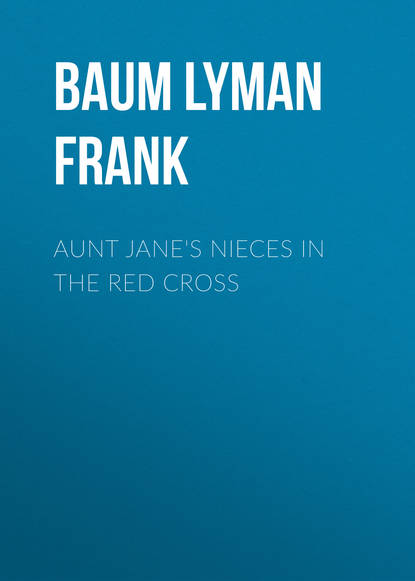По всем вопросам обращайтесь на: info@litportal.ru
(©) 2003-2025.
✖
Aunt Jane's Nieces in the Red Cross
Настройки чтения
Размер шрифта
Высота строк
Поля
Patsy thought of the days that had been wasted, because of their detention at Ostend through Colonel Grau's stupidity.
"I hope so, madam," was all she could reply.
Conversation lagged after this episode. Elizabeth was weeping quietly on her mother's shoulder. Patsy felt relief in the knowledge that she had prepared them, as well as she could, for whatever might wait upon their arrival.
The launch made directly for the ship and as she came alongside to the ladder the rail was lined with faces curious to discover if the errand had been successful. Doctor Gys was there to receive them, smiling horribly as he greeted the two women in black. Maud, seeing that they recoiled from the doctor's appearance, took his place and said cheerfully:
"Mr. Denton is asleep, just now, but by the time you have bathed and had a cup of tea I am quite sure he will be ready to receive you."
"Tell me; how is he? Are you his nurse?" asked the young wife with trembling lips.
"I am his nurse, and I assure you he is doing very well," answered Maud with her pleasant, winning smile. "When he finds you by his side I am sure his recovery will be rapid. No nurse can take the place of a wife, you know."
Patsy looked at her reproachfully, thinking she was misleading the poor young wife, but Maud led the ladies away to a stateroom and it was Dr. Gys who explained the wonderful improvement in the patient.
"Well," remarked Uncle John, "if we'd known he had a chance, we wouldn't have worried so because we were held up. In fact, if we'd known he would get well, we needn't have gone at all."
"Oh, Uncle John!" cried Patsy reprovingly.
"It was your going that saved him," declared the doctor. "I promised to keep him alive, for that little wife of his, and when he took a turn for the worse I had to assume desperate chances – which won out."
Meantime the big Belgian woman and her children had been helped up the ladder by Henderson, who stood respectfully by, awaiting orders for their disposal. The mother had her eye on the shore and was scowling steadily upon it when little Maurie came on deck and strolled toward Mr. Merrick to greet him on his return. Indeed, he had approached to within a dozen feet of the group when the woman at the rail suddenly turned and saw him.
"Aha – mon Henri!" she cried and made a dash toward him with outstretched arms.
"Clarette!"
Maurie stopped short; he grew pallid; he trembled. But he did not await her coming. With a howl that would have shamed a wild Indian he leaped upon the rail and made a dive into the water below.
Even as her engulfing arms closed around the spot where he had stood, there was a splash and splutter that drew everyone to the side to watch the little Belgian swim frantically to the docks.
The woman grabbed a child with either arm and held them up.
"See!" she cried. "There is your father – the coward – the traitor – the deserter of his loving family. He thinks to escape; but we shall capture him yet, and when we do – "
"Hurry, father," screamed the little girl, "or she'll get you."
A slap on the mouth silenced her and set the boy wailing dismally. The boy was accustomed to howl without provocation. He kicked his mother until she let him down. By this time they could discern only Maurie's head bobbing in the distant water. Presently he clambered up the dock and ran dripping toward the city, disappearing among the buildings.
"Madam," said Uncle John, sternly, "you have cost us the best chauffeur we ever had."
She did not understand English, but she shook her fist in Mr. Merrick's face and danced around in an elephantine fashion and jabbered a stream of French.
"What does she say?" he asked Patsy, who was laughing merrily at the absurd scene.
"She demands to be put ashore at once. But shall we do that, and put poor Maurie in peril of being overtaken?"
"Self preservation is the first law of nature, my dear," replied Uncle John. "I'm sorry for Maurie, but he alone is responsible. Henderson," he added, turning to the sailor, "put this woman ashore as soon as possible. We've had enough of her."
CHAPTER XVII
PERPLEXING PROBLEMS
Although the famous battle of Nieuport had come to an end, the fighting in West Flanders was by no means over. All along the line fierce and relentless war waged without interruption and if neither side could claim victory, neither side suffered defeat. Day after day hundreds of combatants fell; hundreds of disabled limped to the rear; hundreds were made prisoners. And always a stream of reinforcements came to take the places of the missing ones. Towns were occupied to-day by the Germans, to-morrow by the Allies; from Nieuport on past Dixmude and beyond Ypres the dykes had been opened and the low country was one vast lake. The only approaches from French territory were half a dozen roads built high above the water line, which rendered them capable of stubborn defence.
Dunkirk was thronged with reserves – English, Belgian and French. The Turcos and East Indians were employed by the British in this section and were as much dreaded by the civilians as the enemy. Uncle John noticed that military discipline was not so strict in Dunkirk as at Ostend; but the Germans had but one people to control while the French town was host to many nations and races.
Strange as it may appear, the war was growing monotonous to those who were able to view it closely, perhaps because nothing important resulted from all the desperate, continuous fighting. The people were pursuing their accustomed vocations while shells burst and bullets whizzed around them. They must manage to live, whatever the outcome of this struggle of nations might be.
Aboard the American hospital ship there was as yet no sense of monotony. The three girls who had conceived and carried out this remarkable philanthropy were as busy as bees during all their waking hours and the spirit of helpful charity so strongly possessed them that all their thoughts were centered on their work. No two cases were exactly alike and it was interesting, to the verge of fascination, to watch the results of various treatments of divers wounds and afflictions.
The girls often congratulated themselves on having secured so efficient a surgeon as Doctor Gys, who gloried in his work, and whose judgment, based on practical experience, was comprehensive and unfailing. The man's horribly contorted features had now become so familiar to the girls that they seldom noticed them – unless a cry of fear from some newly arrived and unnerved patient reminded them that the doctor was exceedingly repulsive to strangers.
No one recognized this grotesque hideousness more than Doctor Gys himself. When one poor Frenchman died under the operating knife, staring with horror into the uncanny face the surgeon bent over him, Beth was almost sure the fright had hastened his end. She said to Gys that evening, when they met on deck, "Wouldn't it be wise for you to wear a mask in the operating room?"
He considered the suggestion a moment, a deep flush spreading over his face; then he nodded gravely.
"It may be an excellent idea," he agreed. "Once, a couple of years ago, I proposed wearing a mask wherever I went, but my friends assured me the effect would be so marked that it would attract to me an embarrassing amount of attention. I have trained myself to bear the repulsion involuntarily exhibited by all I meet and have taught myself to take a philosophic, if somewhat cynical, view of my facial blemishes; yet in this work I can see how a mask might be merciful to my patients. I will experiment a bit along this line, if you will help me, and we'll see what we can accomplish."
"You must not think," she said quietly, for she detected a little bitterness in his tone, "that you are in any way repulsive to those who know you well. We all admire you as a man and are grieved at the misfortunes that marred your features. After all, Doctor, people of intelligence seldom judge one by appearances."
"However they may judge me," said he, "I'm a failure. You say you admire me as a man, but you don't. It's just a bit of diplomatic flattery. I'm a good doctor and surgeon, I'll admit, but my face is no more repellent than my cowardly nature. Miss Beth, I hate myself for my cowardice far more than I detest my ghastly countenance. Yet I am powerless to remedy either defect."
"I believe that what you term your cowardice is merely a physical weakness," declared the girl. "It must have been caused by the suffering you endured at the time of your various injuries. I have noticed that suffering frequently unnerves one, and that a person who has once been badly hurt lives in nervous terror of being hurt again."
"You are very kind to try to excuse my fault," said he, "but the truth is I have always been a coward – from boyhood up."
"Yet you embarked on all those dangerous expeditions."
"Yes, just to have fun with myself; to sneer at the coward flesh, so to speak. I used to long for dangers, and when they came upon me I would jeer at and revile the quaking I could not repress. I pushed my shrinking body into peril and exulted in the punishment it received."
Beth looked at him wonderingly.
"You are a strange man, indeed," said she. "Really, I cannot understand your mental attitude at all."
He chuckled and rubbed his hands together gleefully.
"I can," he returned, "for I know what causes it." And then he went away and left her, still seeming highly amused at her bewilderment.
In the operating room the next day Gys appeared with a rubber mask drawn across his features. The girls decided that it certainly improved his appearance, odd as the masked face might appear to strangers. It hid the dreadful nose and the scars and to an extent evened the size of the eyes, for the holes through which he peered were made alike. Gys was himself pleased with the device, for after that he wore the mask almost constantly, only laying it aside during the evenings when he sat on deck.
It was three days after the arrival of Mrs. Denton and her mother – whose advent had accomplished much toward promoting the young Belgian's convalescence – when little Maurie suddenly reappeared on the deck of the Arabella.
"Oh," said Patsy, finding him there when she came up from breakfast, "where is Clarette?"
He shook his head sadly.
"We do not live together, just now," said he. "Clarette is by nature temperamental, you know; she is highly sensitive, and I, alas! do not always please her."

















